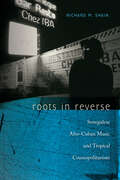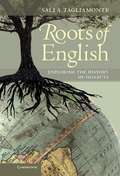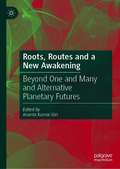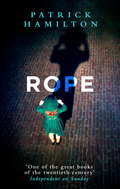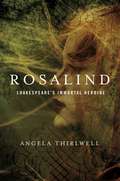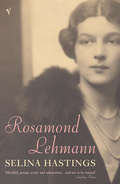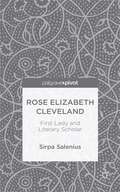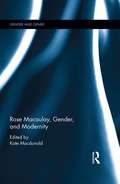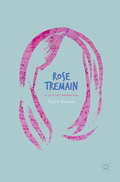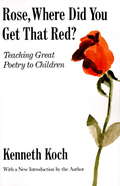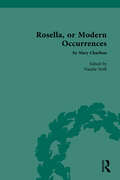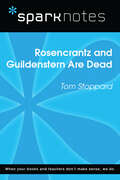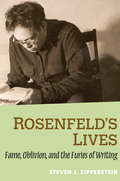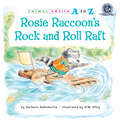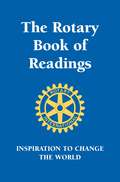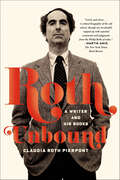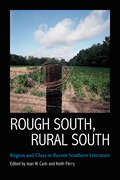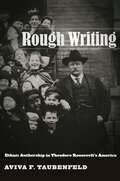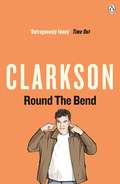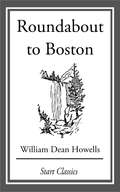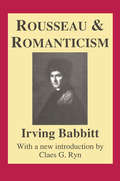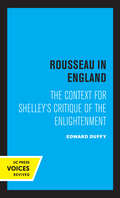- Table View
- List View
Roots in Reverse: Senegalese Afro-Cuban Music and Tropical Cosmopolitanism (Music/culture Ser.)
by Richard M. ShainA study of the impact of Cuban music on Senegalese music and modernityRoots in Reverse explores how Latin music contributed to the formation of the négritude movement in the 1930s. Taking Senegal and Cuba as its primary research areas, this work uses oral histories, participant observation, and archival research to examine the ways Afro-Cuban music has influenced Senegalese debates about cultural and political citizenship and modernity. Shain argues that the trajectory of Afro-Cuban music in twentieth century Senegal illuminates many dimensions of that nation's cultural history such as gender relations, generational competition and conflict, debates over cosmopolitanism and hybridity, the role of nostalgia in Senegalese national culture and diasporic identities. More than just a new form of musical enjoyment, Afro-Cuban music provided listeners with a tool for creating a public sphere free from European and North American cultural hegemony.
Roots of English: Exploring the History of Dialects
by Sali A. TagliamonteWhat is the explanation for the nature, character and evolution of the many different varieties of English in the world today? Which changes in the English language are the legacy of its origins and which are the product of novel influences in the places to which it was transported? Roots of English is a groundbreaking investigation into four dialects from parts of northern Britain out of which came the founding populations of many regions in other parts of the world. Sali Tagliamonte comprehensively describes and analyses the key features of the dialects and their implications for subsequent developments of English. Her examination of dialect features contributes substantive evidence for assessing and understanding bigger issues in sociolinguistic theory. Based on exciting new findings, the book will appeal to those interested in dialects, from the Anglophile to the syntactician.
Roots, Routes and a New Awakening: Beyond One and Many and Alternative Planetary Futures
by Ananta Kumar GiriThis book seeks to find creative and transformative relationship among roots and routes and create a new dynamics of awakening so that we can overcome the problems of closed and xenopbhobic roots and rootless cosmopolitanism. The book draws upon multiple philosophical and spiritual traditions of the world such as Siva Tantra, Buddhist phenomenology and Peircean Semiotics and discusses the works of Ibn-Arabi, Thoreau, Tolstoy, Gandhi and Raimon Panikkar,among others.The book is transdiscipinary building on creative thinking from philosophy, anthropology, political studies and literature. It is a unique contribution for forging a new relationship between roots and routes in our contemporary fragile and complex world.
Rope
by Patrick HamiltonThe brilliantly tense play that became Hitchcock's masterpiece, starring James Stewart.Believing themselves to be intellectually superior to their contemporaries, flatmates Brandon and Philip murder their friend David Kentley purely to see if they can get away with it. They then throw a cocktail party, serving food from the top of the trunk where they have hidden David's body. Their guests include both David's father and fiancée, as well as college lecturer Rupert Cadell, who becomes increasingly suspicious as the evening wears on.
Rosalind: A Biography of Shakespeare's Immortal Heroine
by Angela ThirlwellA unique biography exploring Shakespeare’s iconic Rosalind, heroine of As You Like It, seen through the eyes of the artists who have brought her to life. Into the spotlight steps Rosalind, from As You Like It. She's alive. She’s modern. She's also a fiction. Played by a boy actor in 1599, Rosalind is a girl who gets into men's clothes so that she can investigate the truth about love. Both male and female, imaginary and real, her intriguing duality gives her a special role. This book is for everyone who has ever loved Shakespeare. Rosalind, his most innovative heroine, can never die. There is no clock in the Forest of Arden where Rosalind finds herself and applies her mercurial wit to teach her lover, Orlando, how to become her perfect partner, issues which consume men and women today. This highly original biography of Rosalind contains exclusive new interviews with Juliet Rylance, Sally Scott, Janet Suzman, Juliet Stevenson, Michelle Terry, award-winning director Blanche McIntyre, as well as insights from Michael Attenborough, Kenneth Branagh, Greg Doran, Rebecca Hall, Adrian Lester, Pippa Nixon, Vanessa Redgrave, and Fiona Shaw. Exploring the fictitious life and the many after-lives of Rosalind, Angela Thirwell delves into the character’s perennial influence on drama, fiction and art. For any fan of the theater, this book ranges far and wide across the Elizabethan world, sexual politics, autobiography, and filmography, bringing Shakespeare's immortal heroine to new and vivid life.
Rosamond Lehmann: A Life
by Selina HastingsThe life of Rosamond Lehmann was as romantic and harrowing as that of any of her fictional heroines. Her first novel, the shocking Dusty Answer, became wildly successful launching her career as a novelist and, just as her novels depicted the tempestuous lives of her heroines, Rosamond's personal life would be full of heartbreaking affairs and lost loves. Escaping from a disastrous early marriage Rosamond moved right into the heart of Bloomsbury society with Wogan Philipps. Later on she would embark on the most important love affair of her life, with the poet Cecil Day Lewis; nine years later he abandoned her for a young actress - a betrayal from which she would never recover. Selina Hastings masterfully creates a portrait of a woman whose dramatic life, work and relationships criss-crossed the cultural, literary and political landscape of England in the middle of the twentieth century.
Rose Elizabeth Cleveland: First Lady and Literary Scholar
by Sirpa SaleniusRose Elizabeth Cleveland was the First Lady of the United States when she assisted her brother, Grover Cleveland. She was also a literary scholar, novelist, and a poet who published work that empowered women. This book positions Cleveland in the historical context of the early twentieth century, when she helped shape female subjectivity and agency.
Rose Macaulay, Gender, and Modernity (Gender and Genre)
by Kate MacdonaldThis book is the first collection on the British author Rose Macaulay (1881-1958). The essays establish connections in her work between modernism and the middlebrow, show Macaulay’s attentiveness to reformulating contemporary depictions of gender in her fiction, and explore how her writing transcended and celebrated the characteristics of genre, reflecting Macaulay’s responses to modernity. The book’s focus moves from the interiorized self and the psyche’s relations with the body, to gender identity, to the role of women in society, followed by how women, and Macaulay, use language in their strategies for generic self-expression, and the environment in which Macaulay herself and her characters lived and worked. Macaulay was a particularly modern writer, embracing technology enthusiastically, and the evidence of her treatment of gender and genre reflect Macaulay’s responses to modernism, the historical novel, ruins and the relationships of history and structure, ageing, and the narrative of travel. By presenting a wide range of approaches, this book shows how Macaulay’s fiction is integral to modern British literature, by its aesthetic concerns, its technical experimentation, her concern for the autonomy of the individual, and for the financial and professional independence of the modern woman. There are manifold connections shown between her writing and contemporary theology, popular culture, the newspaper industry, pacifist thinking, feminist rage, the literature of sophistication, the condition of ‘inclusionary’ cosmopolitanism, and a haunted post-war understanding of ruin in life and history. This rich and interdisciplinary combination will set a new agenda for international scholarship on Macaulay’s works, and reformulate contemporary ideas about gender and genre in twentieth-century British literature.
Rose Tremain
by Emilie WalezakThis comprehensive chronological introduction offers a detailed analysis of Rose Tremain's novels and examines the critical reception of her work. It situates Tremain - listed by Granta magazine as one of the twenty most promising young British novelists in 1983 - in the landscape of contemporary British literature by demonstrating how the variety of her work touches upon major concerns of contemporary fiction. The book aims to satisfy the needs of students by providing an extensive reading of Tremain's novels based on critical discussions of key notions in contemporary literary theory and cultural studies. It includes a comprehensive bibliography and overview of Tremain's critical reception. It points up the suitability of Tremain's novels as practical illustrations of major concepts in contemporary literary debates.
Rosella, or Modern Occurrences: by Mary Charlton (Chawton House Library: Women's Novels)
by Natalie NeillMary Charlton's 1799 Rosella, or Modern Occurrences is a fascinating novel that brokers between conservative and feminist ideas, humour and horror, and indulgence in and ridicule of sentimental tropes. Written in imitation of Cervantes’s Don Quixote (1615) and Lennox’s The Female Quixote (1752), Rosella belongs to a large class of comic works in which female readers and novelists are satirized. This edition not only addresses the gap in knowledge about Charlton’s work, but will be of particular interest to scholars working on the Romantic literary market of the 1790s, especially Minerva Press publications. The book engages with many of the themes explored in eighteenth-century and Romantic literature, from women’s writing and female education to popular fiction and sensibility. Accompanied by a new introduction by Professor Natalie Neill, this title will be of great interest to students and scholars of literary history.
Rosencrantz and Guildenstern are Dead (SparkNotes Literature Guide Series)
by SparkNotesRosencrantz and Guildenstern are Dead (SparkNotes Literature Guide) by Tom Stoppard Making the reading experience fun! Created by Harvard students for students everywhere, SparkNotes is a new breed of study guide: smarter, better, faster. Geared to what today's students need to know, SparkNotes provides: *Chapter-by-chapter analysis *Explanations of key themes, motifs, and symbols *A review quiz and essay topicsLively and accessible, these guides are perfect for late-night studying and writing papers
Rosenfeld's Lives: Fame, Oblivion, and the Furies of Writing
by Steven J. ZippersteinBorn in Chicago in 1918, the prodigiously gifted and erudite Isaac Rosenfeld was anointed a "genius" upon the publication of his "luminescent" novel, Passage from Home and was expected to surpass even his closest friend and rival, Saul Bellow. Yet when felled by a heart attack at the age of thirty-eight, Rosenfeld had published relatively little, his life reduced to a metaphor for literary failure. In this deeply contemplative book, Steven J. Zipperstein seeks to reclaim Rosenfeld's legacy by "opening up" his work. Zipperstein examines for the first time the "small mountain" of unfinished manuscripts the writer left behind, as well as his fiercely candid journals and letters. In the process, Zipperstein unearths a turbulent life that was obsessively grounded in a profound commitment to the ideals of the writing life. Rosenfeld's Lives is a fascinating exploration of literary genius and aspiration and the paradoxical power of literature to elevate and to enslave. It illuminates the cultural and political tensions of post-war America, Jewish intellectual life of the era, and--most poignantly--the struggle at the heart of any writer's life.
Rosie Raccoon's Rock and Roll Raft (Animal Antics A to Z)
by Barbara deRubertisIt’s the Rocky River Raft Race, and Rosie Raccoon is rarin’ to go! Will her Rock and Roll Raft and some clever thinking get her through the Roller Coaster Rapids . . . and all the way to the finish line?
Rotary Book of Readings: Inspiration to Change the World (Little Book. Big Idea.)
by Hobart Rotary ClubThe Rotary Book of Readings collects over 175 quotations exploring the goals and values of this preeminent humanitarian organization. In its pages you will discover the core principles embodied by Rotary International, including volunteerism, leadership, community, and peace, all through these inspirational quotes—many from noted members of Rotary International. The Rotary Book of Readings is an excellent resource for Rotarians to help inspire their weekly meetings, to instill Rotarian values in new members, to use a gift for guest speakers, for local RYLA, Rotary student exchange and other youth programs, as a membership recruitment aid, and much more. Developed by the members of the Rotary Club of Hobart, New York, sales of The Rotary Book of Readings help support projects throughout the world.Since its founding in 1905, Rotary International has been one of the leading humanitarian and volunteer outreach organizations in the United States. Over 1 million members strong, their commitment to the ideals of human rights and improving life for everyone has had an enormous impact, touching the lives of countless people. And through it all, Rotary International has followed the direction of their guiding principles, core values that have served as the cornerstone of Rotary International’s global mission. The primary goal of Rotary International is to bring together like-minded people to provide humanitarian services and help build goodwill and peace in the world. Explore their mission like never before in The Rotary Book of Readings, and help to make the world a better place—one step at a time.
Roth Unbound: A Writer and His Books
by Claudia Roth PierpontA critical evaluation of Philip Roth—the first of its kind—that takes on the man, the myth, and the workPhilip Roth is one of the most renowned writers of our time. From his debut, Goodbye, Columbus, which won the National Book Award in 1960, and the explosion of Portnoy's Complaint in 1969 to his haunting reimagining of Anne Frank's story in The Ghost Writer ten years later and the series of masterworks starting in the mid-eighties—The Counterlife, Patrimony, Operation Shylock, Sabbath's Theater, American Pastoral, The HumanStain—Roth has produced some of the great American literature of the modern era. And yet there has been no major critical work about him until now. Here, at last, is the story of Roth's creative life. Roth Unbound is not a biography—though it contains a wealth of previously undisclosed biographical details and unpublished material—but something ultimately more rewarding: the exploration of a great writer through his art. Claudia Roth Pierpont, a staff writer for The New Yorker, has known Roth for nearly a decade. Her carefully researched and gracefully written account is filled with remarks from Roth himself, drawn from their ongoing conversations. Here are insights and anecdotes that will change the way many readers perceive this most controversial and galvanizing writer: a young and unhappily married Roth struggling to write; a wildly successful Roth, after the uproar over Portnoy, working to help writers from Eastern Europe and to get their books known in the West; Roth responding to the early, Jewish—and the later, feminist—attacks on his work. Here are Roth's family, his inspirations, his critics, the full range of his fiction, and his friendships with such figures as Saul Bellow and John Updike. Here is Roth at work and at play.Roth Unbound is a major achievement—a highly readable story that helps us make sense of one of the most vital literary careers of the twentieth and twenty-first centuries.
Rough South, Rural South: Region and Class in Recent Southern Literature
by Jean W. Cash and Keith PerryEssays in Rough South, Rural South describe and discuss the work of southern writers who began their careers in the late twentieth and early twenty-first centuries. They fall into two categories. Some, born into the working class, strove to become writers and learned without benefit of higher education, such writers as Larry Brown and William Gay. Others came from lower- or middle-class backgrounds and became writers through practice and education: Dorothy Allison, Tom Franklin, Tim Gautreaux, Clyde Edgerton, Kaye Gibbons, Silas House, Jill McCorkle, Chris Offutt, Ron Rash, Lee Smith, Brad Watson, Daniel Woodrell, and Steve Yarbrough. Their twenty-first-century colleagues are Wiley Cash, Peter Farris, Skip Horack, Michael Farris Smith, Barb Johnson, and Jesmyn Ward. In his seminal article, Erik Bledsoe distinguishes Rough South writers from such writers as William Faulkner and Erskine Caldwell. Younger writers who followed Harry Crews were born into and write about the Rough South. These writers undercut stereotypes, forcing readers to see the working poor differently. The next pieces begin with those on Crews and Cormac McCarthy, major influences on an entire generation. Later essays address members of both groups—the self-educated and the college-educated. Both groups share a clear understanding of the value of working-class southerners. Nearly all of the writers hold a reverence for the South's landscape and its inhabitants as well as an affinity for realistic depictions of setting and characters.
Rough Writing: Ethnic Authorship in Theodore Roosevelt’s America (Nation of Nations #6)
by Aviva F. TaubenfeldAs the United States struggled to absorb a massive influx of ethnically diverse immigrants at the turn of the twentieth century, the question of who and what an American is took on urgent intensity. It seemed more critical than ever to establish a definition by which Americanness could be established, transmitted, maintained, and judged. Americans of all stripes sought to articulate and enforce their visions of the nation’s past, present, and future; central to these attempts was President Theodore Roosevelt.Roosevelt fully recognized the narrative component of American identity, and he called upon authors of diverse European backgrounds including Israel Zangwill, Jacob Riis, Elizabeth Stern, and Finley Peter Dunne to promote the nation in popular written form. With the swell and shift in immigration, he realized that a more encompassing national literature was needed to “express and guide the soul of the nation.” Rough Writing examines the surprising place and implications of the immigrant and of ethnic writing in Roosevelt’s America and American literature.
Round the Bend
by Jeremy ClarksonJeremy Clarkson gets REALLY riled up in Round the BendWhat's it like to drive a car that's actively trying to kill you?This and many other burning questions trouble Jeremy Clarkson as he sets out to explore the world from the safety of four wheels. Avoiding the legions of power-crazed traffic wombles attempting to block highway and byway, he he:- Shows how the world of performance cars may be likened to Battersea Dogs Home- Reveals why St Moritz may be the most bonkers town in all of the world- Reminds us that Switzerland is so afraid of snow that any flakes falling on the road are immediately arrested- Argues that washing a car is a waste of timeFunny, globe-trotting, irreverent and sometimes downright rude, Round the Bend is packed with curious and fascinating but otherwise hopelessly useless stories and facts about everything under the sun (and just occasionally cars). It's Jeremy Clarkson at his brilliant best.Praise for Jeremy Clarkson'Brilliant . . . laugh-out-loud' Daily Telegraph'Outrageously funny . . . will have you in stitches' Time Out'Very funny . . . I cracked up laughing on the tube' Evening Standard
Roundabout to Boston
by William Dean HowellsWilliam Dean Howells (1837-1920) was an American realist author and literary critic. He wrote his first novel, Their Wedding Journey, in 1871, but his literary reputation really took off with the realist novel A Modern Instance, published in 1882, which describes the decay of a marriage. His 1885 novel The Rise of Silas Lapham is perhaps his best known, describing the rise and fall of an American entrepreneur in the paint business. His social views were also strongly reflected in the novels Annie Kilburn (1888) and A Hazard of New Fortunes (1890). While known primarily as a novelist, his short story "Editha" (1905) - included in the collection Between the Dark and the Daylight (1907) - appears in many anthologies of American literature. Howells also wrote plays, criticism, and essays about contemporary literary figures such as Ibsen, Zola, Verga, and, especially, Tolstoy, which helped establish their reputations in the United States. He also wrote critically in support of many American writers. It is perhaps in this role that he had his greatest influence.
Rousseau and German Idealism
by David JamesThe claim that Rousseau's writings influenced the development of Kant's Critical philosophy, and German Idealism, is not a new one. As correct as the claim may be, it does not amount to a systematic account of Rousseau's place within this philosophical tradition. It also suggests a progression whereby Rousseau's achievements are eventually eclipsed by those of Kant, Fichte and Hegel, especially with respect to the idea of freedom. In this book David James shows that Rousseau presents certain challenges that Kant and the idealists Fichte and Hegel could not fully meet, by making dependence and necessity, as well as freedom, his central concerns, and thereby raises the question of whether freedom in all its forms is genuinely possible in a condition of human interdependence marked by material inequality. His study will be valuable for all those studying Kant, German idealism, and the history of eighteenth- and nineteenth-century ideas.
Rousseau and Romanticism (Bcl Ser. #No. Ii)
by Otto ScottThis volume is the best-known and most widely discussed work of the influential scholar and critic Irving Babbitt (1865-1933), intellectual leader of the movement known as the New Humanism. It is also the work that best conveys the ethical and aesthetic core of his thought. Broad in scope, it examines a variety of manifestations of romanticism and presents a typology of the imaginative inclinations of that movement Rousseau is analyzed as paradigmatic of the ethical and aesthetic sensibility that is replacing the classical and Christian outlook in the Western world. For Babbitt, works of imagination are integral to human life in general. He explores romanticism with a view to its implications for Western civilization.Babbitt identifies serious ethical, religious, aesthetic, and philosophical problems in the modern world, but he also shows how remedies to those problems must incorporate the best insights of modernity. First published in 1919, the book is strikingly relevant to today's discussion of the crisis of American and Western culture and education. Babbitt anticipated and analyzed dangerous cultural trends whose consequences are now widely bemoaned. He applies to these phenomena an intellectual breadth and depth rare today. At the end of the twentieth century his prescriptions for dealing with the central problems of Western civilization have acquired an acute urgency. At a time of much renewed interest in Rousseau, Babbitt's book offers a penetrating commentary that challenges widely held beliefs and interpretations.Graced with a lengthy and wide-ranging new introduction by Claes G. Ryn, Rousseau and Romanticism is simultaneously a work of literary history, criticism, and a theory of civilization. In addressing its special subject, this classic study reflects the main themes of Babbitt's thought, making it representative of his work as a whole. Ryn explicates and critically assesses Babbitt's central ideas, refutes widely circulating
Rousseau in Drag
by Rosanne Terese KennedyThrough a series of close readings of most of Rousseau's major writings, this book provides a new interpretation of the eighteenth-century philosopher's sexual politics. The text argues that Rousseau's writings provide a critique of not only normative gender identity, but also normative familial and kinship relations.
Rousseau in England: The Context for Shelley's Critique of the Enlightenment
by Edward DuffyThis title is part of UC Press's Voices Revived program, which commemorates University of California Press’s mission to seek out and cultivate the brightest minds and give them voice, reach, and impact. Drawing on a backlist dating to 1893, Voices Revived makes high-quality, peer-reviewed scholarship accessible once again using print-on-demand technology. This title was originally published in 1979.
